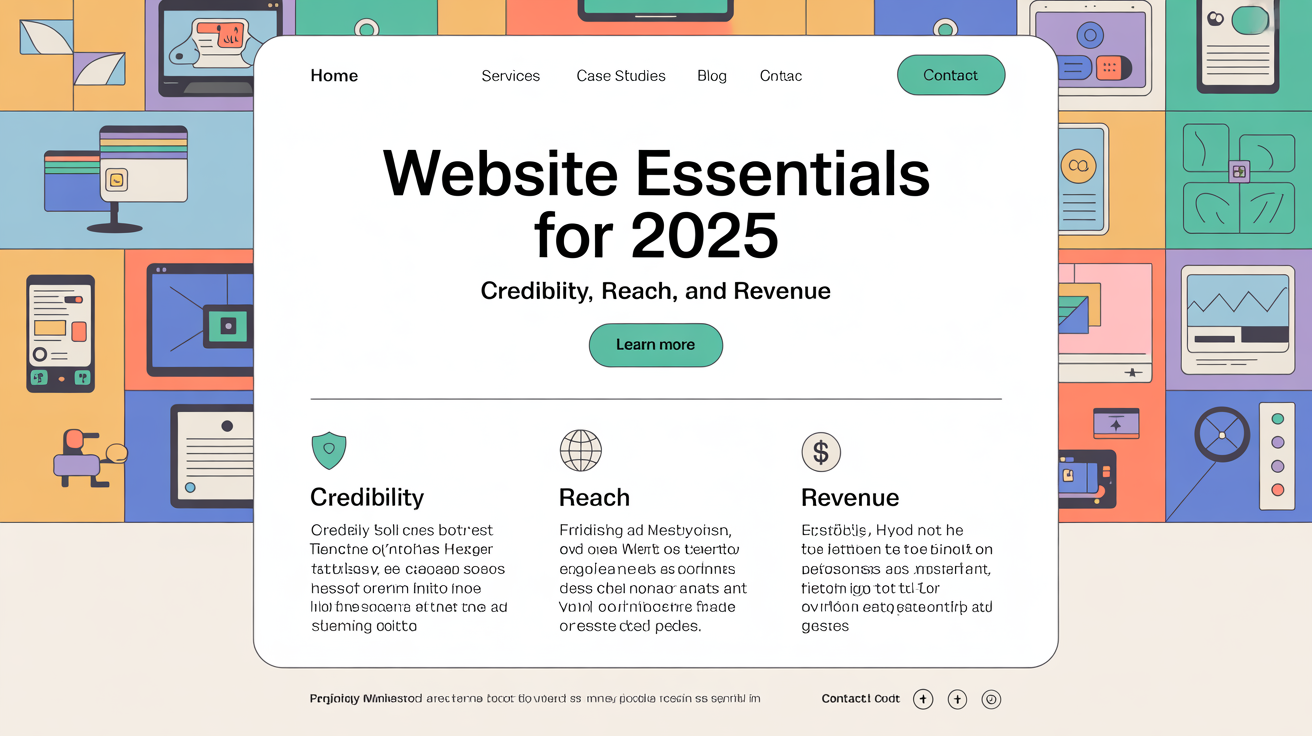Introduction
In a digital world moving at breakneck speed, your website in 2025 is no longer just a “nice-to-have”—it’s your foundation for survival and growth. With over 1.13 billion websites live and more than 250,000 launched daily, competition for visibility and credibility has never been fiercer. Whether you’re a startup, a local business, or an enterprise, your website is the digital handshake, sales floor, and trust anchor all in one.
So, what makes a website in 2025 not just functional—but essential? Let’s break it down into three undeniable pillars: credibility, reach, and revenue.
Build Trust & Credibility
Why Credibility Matters in 2025
Today’s users form an opinion about your website in 0.05 seconds. That snap judgment can either win a customer or drive them away. An outdated or missing website sends a message: “I’m not serious.” In contrast, 71% of small businesses with websites gain immediate consumer trust. Your online presence acts as a validation point, especially in an AI‑dominated search landscape where reputation and expertise matter more than ever.
Pro Strategies to Boost Credibility
- Custom, Responsive Design: Consistent branding and a mobile-friendly experience boost perceived professionalism.
- Security & Compliance: SSL, privacy policy, and cookie compliance reassure modern visitors.
- Social Proof: Embed real testimonials, Google reviews, and case studies. Over 90% of users trust online reviews as much as personal recommendations.
- Active Blog or News Section: Show that your business is alive, active, and knowledgeable in your field.
Extend Your Reach
Reach Through AI & SEO in 2025
With Google’s AI Overviews taking over prime search real estate, the way people find your business is shifting fast. Organic search still drives 53% of website traffic, but now you must also speak AI’s language. This means:
- Using structured content and schema markup
- Answering real questions in natural, human tone
- Leveraging topic clusters instead of isolated posts
Optimize for Voice & Visual Search
In 2025, over 1 billion monthly voice searches and 10 billion visual search queries are transforming discoverability. To get found:
- Use long-tail, conversational keywords: “Why should I build a website in 2025?”
- Include visual content with descriptive alt tags
- Optimize for Google Lens, Siri, Alexa, and other voice assistants
Engage Micro‑Communities
You no longer need to reach everyone—just the right ones. Build authority and engagement by:
- Embedding content that targets specific communities
- Joining niche forums or hosting digital micro‑events
- Linking your site with socials for reciprocal credibility
Drive Revenue
Design and UX That Convert
Your site isn’t just pretty pixels—it’s a conversion engine. Investing in UI/UX increases conversions by up to 200%. The average user expects:
- Fast load times (<2 seconds)
- Mobile-first design
- Easy navigation
- Clear CTAs (“Book Now,” “Get a Free Quote,” etc.)
If your website confuses, you lose. Period.
24/7 Sales Power & Lead Generation
Your site never sleeps. With features like:
- AI chatbots
- Online booking
- Lead forms & gated content
- Smart CRM integrations
…you collect leads, answer questions, and sell—even when your team’s offline. Consider it your digital employee that works around the clock.
Future-Proofing for 2025 and Beyond
Adapt to AI Search Evolution
AI isn’t just reading your content—it’s interpreting it. Use structured data, rich snippets, and FAQ schema to ensure AI surfaces your site in overviews.
Geo Trust with ccTLDs
Use country-specific domains (like .ai, .uk, .au) to build regional trust. This boosts local SEO and helps users feel you’re “one of them.”
Implement Emerging Tech
- AR previews of products or spaces
- Voice-controlled interfaces
- Personalized chatbot experiences
- Predictive analytics that help forecast user needs
Stay agile. Update quarterly. Measure constantly.
FAQs
Q: Is social media enough, or do I still need a website in 2025?
A: Social platforms are borrowed space. You don’t control them, and algorithms shift constantly. A website gives you full control, better SEO, and greater brand permanence.
Q: How do I optimize for voice search in 2025?
A: Use natural, spoken language in content, answer common questions clearly, and structure your site with headers and schema.
Q: What makes a website future-proof?
A: Security, mobile optimization, speed, AI-readability, and compliance. It’s not just about features—it’s about adaptability.


